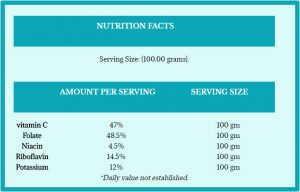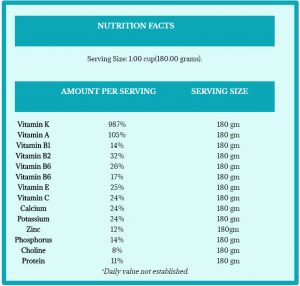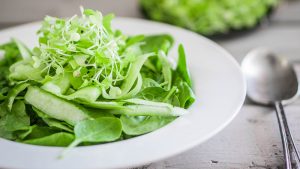Spinach is popularly listed as a “superfood,” and is commonly cited as the healthiest, easiest-to-eat food for human beings, and can be eaten in a dizzying amount of different ways.
However, spinach does contain a lesser-known health risk, that certain people need to be aware of, and we’ll break this down below.
This article lays out the full story about the health benefits of spinach. Why is spinach supposed to be so great for us? What is a potential risk in overeating on spinach?

Even in my own experience, spinach is a must when I’m at the grocery store. It lasts a long time in the fridge, but nothing compares to how adaptable spinach is.
Spinach has a home in food from cultures all over the world, from Italian food, to Mexican or Caribbean food, to, Thai, Indonesian, Indian, African, and Greek food, and much, much more.
No matter what I’m cooking for friends or family, spinach is my favorite way to add a luscious soft flavor and satisfying “oomph” to my meal without overpowering the other tastes.
Even though spinach is an age-old favorite, dating back to Popeye and his predecessors, science has recently discovered even more reasons to eat more of this outstandingly nutritious superfood.
WHAT IS SPINACH?
Native to central and western Asia, spinach was first introduced to the ancient Chinese as “Persian vegetable,” and is a healthy, flavorful leafy green that goes well in salads, and makes a great addition to just about any savory dish.
Spinach has almost zero fat or cholesterol, and is an excellent source of zinc and niacin, as well as fiber, protein, and a number of key vitamins and minerals. Spinach has a light, bittersweet taste that is not overpowering.
WHAT IS SPINACH GOOD FOR?
Also called “Spanish vegetable” by the English through the middle ages, spinach is good for a wide variety of applications in the kitchen.
Spinach is also chock-full of flavonoids, a powerful antioxidant shown to possess properties such as being anti-allergic, anti-inflammatory, anti-microbial, anti-viral, anti-cancer, and even anti-asthma..
Spinach is healthy, no question, but what is spinach good for it in the kitchen, and how can we work with it?
Spinach is great in purées for sauces, and is a key ingredient in dips, quiches, soups, salads, sandwiches, curries, smoothies, pizzas, and even Spanakopita, the delicious and semi-famous Greek spinach pie.
NUTRITIONAL VALUE OF SPINACH
Spinach is a time-tested classic for seekers of healthy food, with new benefits being discovered all the time. Here are some great key factors demonstrating the nutritional value of spinach.
FRESH SPINACH NUTRITION
The nutritional benefits of fresh spinach are many. It used to be popular to cook spinach, and this can leach out vital nutrients. Keeping your spinach raw and uncooked has great benefits for health. Raw spinach has the advantage over cooked spinach in that it is higher in:
- vitamin C
- folate
- niacin
- riboflavin
- potassium

It looks like Popeye’s logic wasn’t wrong – and further, everyday spinach has incredible health effects beyond what you might have thought.
WHAT VITAMINS IN SPINACH?
One great question is about the vitamins that can be found in spinach. There are a ton of vitamins in spinach, and here is a list of some of its top vitamins [source]:

As we can see, spinach doesn’t short-sell anyone when it comes to nutrition.
SPINACH CALORIES
If you’re concerned about calories, you’re going to love spinach.
One cup of spinach has about as many calories as three Tic-Tacs, or about 7 calories. This is a huge benefit of spinach, because if you’re watching your weight, spinach is not going to hurt you.
The average American eats about 2.5 pounds of spinach per year, which is about 50 cups of spinach. This is literally 350 calories per year.
350 calories is less than one meal for most people, so literally spinach barely pings the radar when it comes to calories.
Literally, as the math above shows, we eat fewer calories from spinach in a year than we do from one typical meal.
Especially once we consider that the body does burn calories to digest food, there’s no doubt that spinach has a microscopic calorie count.
33 SPINACH HEALTH BENEFITS

The health benefits of spinach are without doubt. But to really fully flesh out the reasons “pro” for eating spinach, here are 33 highlights:
1.) Heart health – Spinach has some heartwarming benefits for cardiac health, which directly increase longevity, and time with our loved ones. Spinach has been shown to be high in omega-3 fatty acids, which are excellent for cardiac health. [source]
Additionally, the rich folate content of spinach causes a decrease in homocysteine levels, which directly reduces the risk of heart disease. [source]
Heart disease remains the number one biggest killer of Americans every year, so this is a huge deal, that spinach reduces the risk of cardiovascular disease. I’m sure we all know someone or another who has passed away due to this sad, all-too-common illness.
2.) Acne Prevention – One of the best, most surprising or eyebrow-raising spinach health benefits is in helping prevent acne.
The alkaline properties of spinach, including its rich chlorophyll content, all contribute to fighting the bacteria that cause acne.
Spinach is also rich in vitamin A, which has been shown to help skin in all kinds of ways, including preventing dead skin cells from clogging pores, reducing how oily our skin can get, and helping overall health in general. [source]
3.) Heartburn – Spinach is famous for helping prevent acid reflux. Getting heartburn more than two times a week is indicative of suffering from acid reflux disease, and of course, spinach can help you with that. More formally referred to as gastroesophageal reflux disease, or GERD, spinach is a great pillar of health for people suffering from GERD.
Experts in this disease recommend not pairing spinach with creamy substances, or frying it. More baby spinach, eaten raw, or lightly cooked without high-fat additives are the prognosis for smoother digestion, and increased personal control over one’s own GERD.
4.) Constipation – Since spinach is so high in fiber, it is a favorite for helping with regularity. If you or a friend is suffering from constipation on a consistent basis, spinach could be the key.
It can be fairly said that spinach is the most vital food for digestion since the dawn of time. “Raw spinach holds the finest organic material for the cleansing, reconstruction, and regeneration of the intestinal tract. Raw spinach juice-100 ml, mixed with an identical quantity of water and taken twice daily, will cure the most aggravated cases of constipation in a few days.” [source]
5.) Hair growth – One more surprising health benefit of spinach is that it aids hair growth. You might not believe it, but spinach is shown to do a number of great things for hair growth.
The high protein, vitamin A, and vitamin C content of spinach allows the body to properly regulate oil on the scalp, keeping hair from becoming brittle, and helping prevent hair loss.
These factors also help hair to grow more quickly. This is a big deal for people with histories of hair loss in their family. To get this going for yourself, one great recipe is to take one cup of spinach leaves, mix it with one tablespoon of honey, olive oil, coconut oil, or castor oil, blend it, making sure it has the right consistency, and then applying the mixture to your scalp, keeping it in place for thirty to sixty minutes. [source]
So overall, this type of approach is a very frugal way to arrive at repaired, shiny, silky hair.
6.) Sleep – Due to its high vitamin counts, spinach is great for helping us sleep healthily. Spinach is, of course, high in vitamin B6, and in magnesium. B6 helps us produce serotonin, which is the hormone that calms us and helps regulate our sleep and wake cycles.
Magnesium is also great for Restless Leg Syndrome, commonly known as RLS; as well as helping a great many other aspects of sleep health. The high calcium content of spinach also helps the body better regulate melatonin, the hormone that helps us maintain our circadian rhythms.
So whether you cook it, leave it raw, or however you eat your spinach, it’s going to help you sleep better, no question.
7.) Weight Loss – Almost a no-brainer, with 7 calories per cup, spinach is a great way to fill up on healthy food without risking weight gain. There are some very compelling spinach benefits for weight loss, and if you’re trying to cut pounds and shed fat, spinach is your best friend.
Spinach is the perfect way to change a habit of hedonistic hunger, which is a craving for unhealthy food that harms our long-term health. This happens mainly out of habit, because we most frequently crave what we’ve most recently eaten, whatever we just ate.
Spinach is perfect for changing our hunger patterns to what’s called homeostatic hunger, which is a more real hunger for the raw vitamins and nutrients the body needs.
8.) Anti-cancer – Spinach has been shown time and time again to have anti-cancer and anti-inflammatory antioxidants. There is a mountain of research showing how spinach helps fight cancer, and to help start unpacking this, it really starts with how spinach has to do with protecting our DNA during replication.
The high folates in spinach protect our genetic blueprints from changing during cell division, a risk that can lead to cancer, and early onset forms of aging in other ways.
It’s definitely no longer out-of-the-ordinary to tout the anticancer benefits of spinach, and you will find spinach advocates for people at risk of cancer all the way to the highest levels of research.
9.) Body Alkalizer – Most of us have an acidic diet, between the coffee, tea, and other food we eat, this can be a problem that the alkaline properties of spinach counteracts.
Body acidity can lead to imbalances in gut bacterial levels, and makes us more at risk of yeast growing out of control. A high level of body acidity can also mean more risk of acne, and scarring pimples. By reversing this acidification of the body, spinach protects us against these potential problems.
10.) Bone Health – Filled with vitamin K, spinach protects bones from common risks. Spinach is known for helping bones absorb the minerals they need to be strong; this process is referred to as bone mineralization.
This also helps delay or prevent the onset of osteoporosis. Spinach helps with the bones’ ability to absorb minerals. It’s vital to keep in mind that spinach has high oxalate content, which can also work to block calcium intake, so if this is a concern for you be sure to at least lightly cook your spinach before serving it.
11.) Eye health – With its copious carotenoids, spinach is excellent for eye health. Spinach protects against cataracts, and macular degeneration, which are risks for our eyes we all face as we get older. There are also high levels of eye-benefitting lutein and zeaxanthin, which “do wonders for your eyes.” [source]
Overall, with its super-food status, it’s no surprise that spinach is a key part of keeping eyes healthy for the long term.
12.) Prevents anemia – High in iron, spinach is a great vegetarian way to prevent iron deficiency. Anemia is commonly experienced by vegetarians, or people who eat a reduced-meat diet. Spinach is a key support in any diet involving reduced meat.
The iron in spinach is what keeps you safe from the risks of anemia, but more specifically, because spinach is also high in calcium, vitamins A, B9, E, and C, as well as fiber, iron, and beta carotene, spinach has been reported to be the number one, hands-down, absolute best food to combat anemia.
To be continued and if you can’t wait the original article is here: 33 Amazing Health Benefits of Spinach







